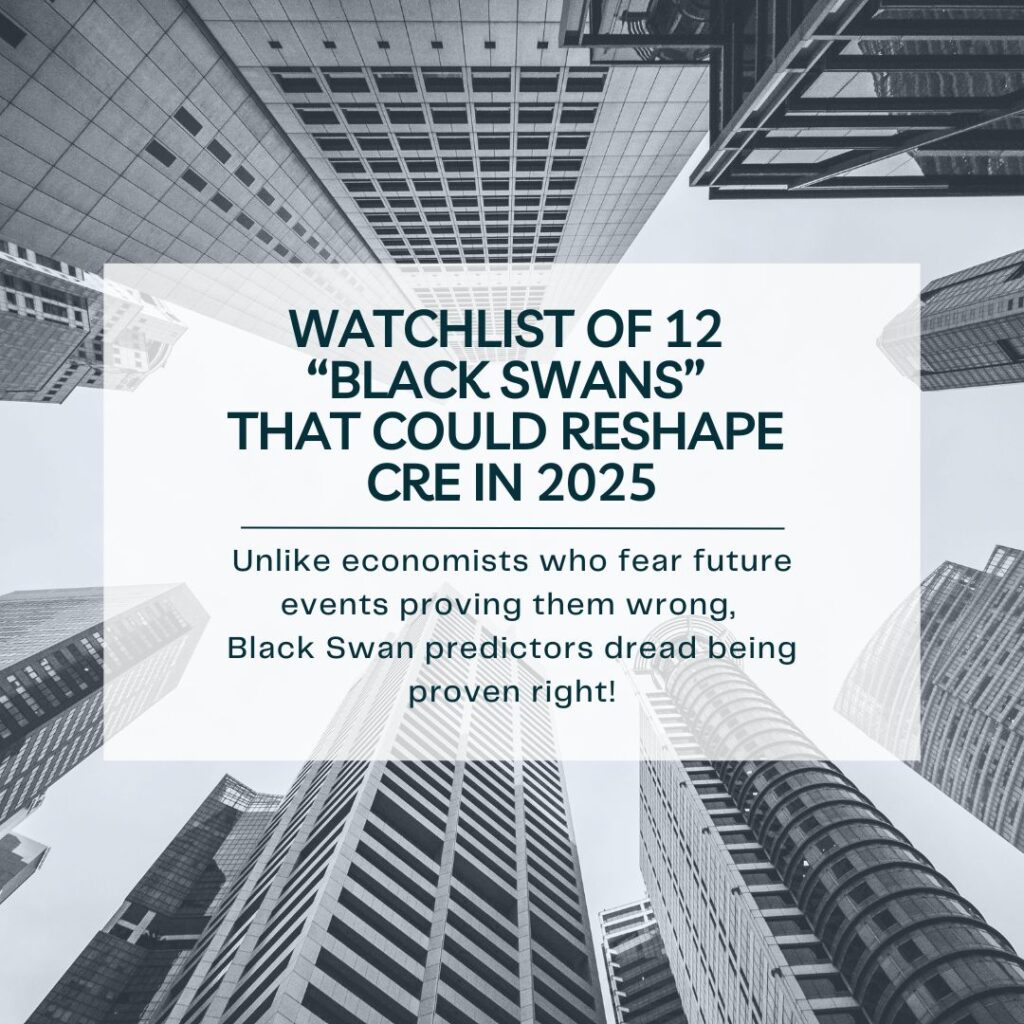Watchlist of 12 “Black Swans”
January 8, 2025

At Capright, we’ve compiled a watch list of 12 potential events that could cast significant shadows on the CRE horizon. While each poses risks, they also present opportunities for bold investors willing to embrace uncertainty.
What Is a Black Swan?
In The Black Swan: The Impact of the Highly Improbable (2007), Nassim Nicholas Taleb defines a Black Swan as a rare, unpredictable event with profound economic impacts. While often disruptive, such events can also create opportunities—as seen with quantitative easing after the Global Financial Crisis and stimulus measures during COVID-19, both of which reshaped markets. Similarly, post-pandemic trends like remote work and enhanced online communication continue to transform societal norms and business practices.
Our Watchlist of 12 Black Swans
1. Geopolitical Escalation
Heightened tensions or conflicts in regions like the South China Sea, Russia/Ukraine, or the Middle East could disrupt global trade and financial markets, leading to unpredictable impacts on CRE demand and investment flows.
2. Cybersecurity Crisis
A significant cyberattack on critical infrastructure—such as the electrical grid or financial systems—could paralyze CRE operations and undermine investor confidence in urban markets. Properties with stronger redundancy systems may see increased demand.
3. Tariff Wars
Intensifying trade conflicts could disrupt global supply chains, driving up construction costs and delaying CRE projects. This might shift tenant demand toward industries with a domestic focus over international trade reliance.
4. Social Media’s Role
The ability of social media to amplify public sentiment could lead to widespread counter-establishment movements, destabilizing certain markets. While this could discourage CRE investment in volatile regions, more stable markets may benefit.
5. Sudden Bank Failures
Unexpected collapses of major financial institutions could severely disrupt credit markets, limiting access to financing and stalling CRE transactions.
6. Crypto Surge
A spike in cryptocurrency values could challenge traditional banking systems and currencies, disrupting and/or innovating CRE financing.
7. Catastrophic Events
Natural or human-made disasters of global scale could lead to massive population shifts, reshaping urban demand and redefining the desirability of certain CRE markets.
8. AI Moves to Warp Speed
Rapid advancements in AI could displace jobs and reduce the need for traditional office spaces, while simultaneously boosting demand for high-tech industrial and data storage facilities.
9. Government Efficiency Initiatives (DOGE)
Efforts to streamline government operations may reduce the need for traditional office space, accelerating the transition to remote work. This trend could weaken demand for CBD offices but increase suburban and residential property values.
10. Energy Market Shock
A sharp rise in oil or energy prices could increase operating costs for CRE properties and cause expansion in energy-intensive sectors and markets.
11. The Rise of BRICS
As BRICS nations form a competitive trading bloc, global investment flows could shift. CRE markets in these countries might see an inflow of investment, while others outside the bloc may experience declines.
12. Legislative and Regulatory Shifts
Dramatic changes in laws or regulations could alter zoning policies, tax incentives, or environmental standards, significantly affecting CRE development pipelines and profitability.
The Big Picture
While the probability of a true Black Swan event emerging in 2025 remains remote, the potential for significant market disruptions cannot be ignored. Historically, savvy investors have demonstrated remarkable agility in navigating risks and capitalizing on opportunities.
That said, only time will tell if the new year delivers a Black Swan event capable of altering the CRE landscape—for better or worse.

CEO & Managing Principal
jmarling@capright.com

Non-Executive Director
swilliams@capright.com

